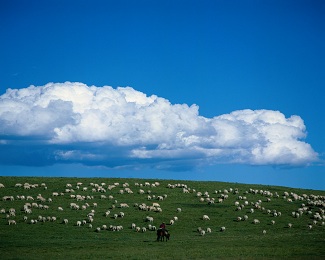My favourite place in
China is the political, social and cultural centre, Beijing; home of the Great
Wall of China, Peking duck and the 2008 Summer Olympics. No place in China has
more to offer in significance, scenic sights and rich history. Whereas Shanghai
has progressed to the status of a modern, metropolitan urban jungle, Beijing
has retained its unique historical character, whilst allowing expansion that
has brought China to the forefront of the 21st century.
 I got the opportunity to visit and live in Beijing during
2010. Being new to China and Chinese culture, I first took a visit to Hong
Kong, knowing it to be more western friendly, afterwards taking an overnight
train to Beijing. The contrast was clearly evident. I arrived at Beijing
Western Railway Station and had never seen so many people in my life. What is
amazing about Beijing is the clear presence of organised chaos. It surprised me
greatly to see that the city ran almost like clockwork despite the large
quantity of people and the clear disregard for the rules on the roads.
I got the opportunity to visit and live in Beijing during
2010. Being new to China and Chinese culture, I first took a visit to Hong
Kong, knowing it to be more western friendly, afterwards taking an overnight
train to Beijing. The contrast was clearly evident. I arrived at Beijing
Western Railway Station and had never seen so many people in my life. What is
amazing about Beijing is the clear presence of organised chaos. It surprised me
greatly to see that the city ran almost like clockwork despite the large
quantity of people and the clear disregard for the rules on the roads.
Whilst in Beijing, I jumped at any opportunity to explore
the city. Beijing not only leads in famous UNESCO sights, it is also a
fantastic city to walk, usually with a marvellous surprise round every corner,
be it a special small eats street serving some of the most delicious food in
China, or a narrow, mysterious Hutong, a feature of Beijing which managed to
exist to the present day. Furthermore, the people of Beijing are so friendly
and individual. Nothing is more noticeable to those who have studied Chinese
that the ‘er’ (儿) sound that is so consistent and present in the true
Beijinger’s accent; a characteristic that gives these already fascinating
people even more wonder.
Though it is difficult
to choose which part of Beijing I enjoyed most, I must say that, although now
almost a cliché, that the Great Wall of China must be recognised as one of the
most surreal and marvellous sights not only in China, but also in the world. It
is no wonder that the Great Wall has managed to impress people in the past, the
present and most definitely continue in to the future. During my time of study
in Beijing, a few Chinese friends took me to a part of the wall where you first
climbed a steep hill to reach its parameters. Once on top of the wall, we
climbed up near vertical towers to obtain some of the most astounding views I
have ever experienced in my life. As the city of Beijing is so fast paced, busy
and compact, seeing the serene, peaceful and vast countryside that surrounds
the Wall, I could see even further how Beijing is a city of contrast and
splendour.
I feel I must also make a quick comment on cuisine in
Beijing. No city in the world have I seen so many restaurants, varying in size,
atmosphere, price and cuisine. Even if you are sitting in a small, local
restaurant in a back alley Hutong, the food is as tasty and succulent as that
from London’s top Michelin restaurants, though the presentation might not
match! It is also easy to see why Peking duck was the food choice of the
Chinese Emperors. A favourite of many westerners, the attention to detail, the
presentation and the taste of Peking duck in Beijing clearly shows us that this
is definitely a dish mastered in China.
Beijing is my favourite place in China mainly due to its
central theme of diversity. The streets, tourist sights, food and people all
help draw in tourists to this fabulous city and help personify China’s long,
developed and mature culture and history, present for over 5,000 years.
Tom Cranshaw is Travel Consultant at China Holidays. If you have any question regarding travelling to China you can call Tom on 0207 487 2999 or email him info@chinaholidays.com
.jpg)


.jpg)
.jpg)
.jpg)

